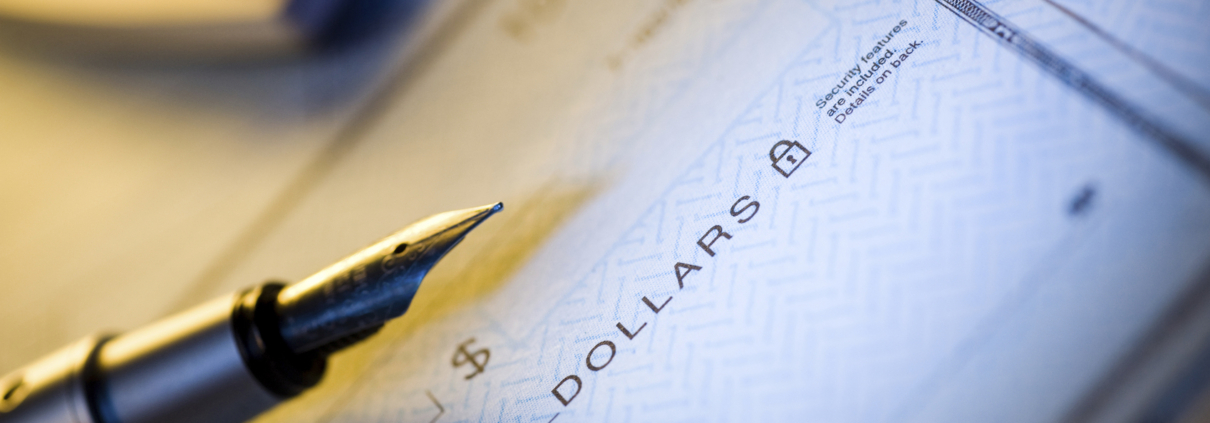“Blank deposit slip” scam is a new twist on an old fraud – Fraud.org
Imagine you’re trying to sell your car and you finally find a buyer. The buyer seems eager to purchase the car and offers to send you a deposit to “hold” the vehicle. The check you receive, however, is for more than you agreed—a “mistake” by the enthused buyer—and now he wants you to work with his bank to fix the overpayment. Not wanting to lose the buyer, you deposit the check in your account and send him back the extra money. Unfortunately, you are not getting that money back, and this car sale isn’t happening. You have stumbled onto a new variation of the fake check scam.
Almost every year, fake check scams are near the top of Fraud.org’s complaint rankings. In most cases, the scam involves a consumer unknowingly depositing a fake check into her personal account and then sending funds from that check back to the scammer via a hard-to-track method like wire transfers or cash reload cards. The scammer gets the cash in hand, and the victim is left owing her bank hundreds or even thousands of dollars when the check comes back as fake.
While this is not a new scam, over the past month we’ve received numerous complaints that suggest scammers may be using a new twist on an old scam. Here’s how it works:
- The victim is given a check to deposit into her personal checking account under the pretense of the check being paid for a job, to cover “shipping” on a car the victim is trying to buy, to cover “taxes” on lottery winnings, or some other ruse.
- The victim deposits the check and withdraws cash against the value of the check.
- Here’s where the new scheme strays from the classic: With cash in hand, the consumer goes to another bank branch and deposits the cash into an account the scammer controls using the blank deposit slips many banks make available in their lobbies.
- Once the victim confirms the deposit, the scammer quickly withdraws the funds in cash from an ATM.
- The victim only becomes aware of the scam days or weeks later when they see a negative balance on their account due to the fake check being rejected by their bank.
The twist here is: the scammers asking the victim to deposit funds from the check directly into the scammer’s account with the blank deposit slip. Victims may be more likely to fall for this version of the scam because the in-person banking aspect adds an air of legitimacy to the set-up.
A woman from California recently shared her Fake Check Scam story with Fraud.org. The woman said she was hired for a work-at-home job, providing administrative support to a company from her home office. After being hired, the woman was overnighted a check worth $3,950 and was asked to “deposit the check into (her) account and withdraw the money and deposit the money into a vendor account,” to cover some office-related costs with the account number the scammer provided at a local bank.
“The following day my ‘employer’ FedEx’ed another check overnight worth $4,950 for materials that weren’t covered with the first check, and asked for me to do the same thing again into a different account.”
The scammer then sent the woman a third check, to “cover office supplies” for the new hire. Fortunately for the woman, the check was stolen from her mailbox before she could cash it, and when she went to report the theft to her bank, they informed her that she was being scammed. She stopped depositing fake checks into her account.
Unfortunately, fake check scams like the one detailed above are very common, and the latest “blank deposit slip” variation of the scam seems to be growing in popularity. Fortunately, there are steps you can take to will help you identify and avoid fake check scams:
- If a purported “employer” or “buyer” gives you a check and insists that you wire or deposit money back into their account, end the transaction immediately; it is a scam. There is no legitimate reason for someone to give you a check and then ask that you give them a part of the check back.
- Never assume the check has cleared, even if you get access to funds from a check you deposit, unless your bank explicitly tells you so. Just because the funds from the check say “available” in your account doesn’t mean the check is good.
- Do not accept checks for more than your asking price or salary. Ask them to write a new check for the correct amount and if they refuse, you will know it’s a scam.
- Never wire or deposit money into the bank accounts of people you do not know.
- Resist high-pressure tactics. Fraudsters will pressure their victims to act now to get a job, or receive payment for an item they are selling, so that they do not think about any of the red flags associated with the scam.
Fake check fraud is not always clear and easy to spot. If you suspect you have become a victim, report it immediately. You can file a complaint at Fraud.org via our secure online complaint form. We’ll share your complaint with our network of more than 90 law enforcement and consumer protection agency partners who can and do put fraudsters behind bars.









